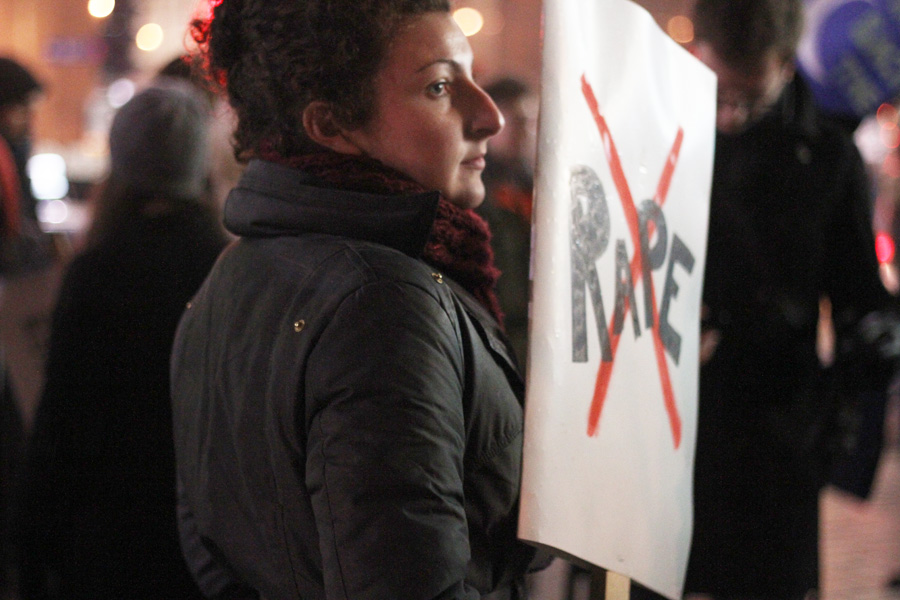The creation of a co-ordinator position and a public forum on the topic of sexual consent were two measures announced by the administration last Thursday in response to recent criticism of McGill’s policies regarding sexual assault.
Thursday’s announcement follows criticism from members of the McGill community about the administration’s response to an ongoing case involving three former McGill football players charged for allegedly sexually assaulting a former Concordia student in 2011.
When a Nov. 1 article in the Montreal Gazette made the case public, Deputy Provost (Student Life and Learning) Ollivier Dyens told media that McGill did not learn of the incident until May 2013. According to Dyens, McGill did not take action against the students at that time because the incident did not take place in “the McGill context” and was therefore under police jurisdiction.
“We understand […] that our overall response did not meet our community’s expectations,” Dyens’ announcement reads. “We did not fully recognize the effect that such events, even if they take place off campus, can and do have on our student population.”
The three measures Dyens announced last Thursday include hiring a full-time coordinator to spread awareness and develop educational programs about sexual assault, hosting a forum in January about sexual consent, and holding an annual Dean of Students Forum on Safe Space every October.
According to Dyens, January’s forum will serve as the basis for a discussion on ways McGill can improve its resources.
“We want this conversation to help us figure out where exactly are the pressure points, where do we need to act, who needs to do what, and according to what timeline,” he said.
Joey Shea, co-chair of January’s forum and vice-president university affairs for the Students’ Society of McGill University (SSMU), said she hopes the forum will engage a diverse range of people.
“[The administration] want[s] it to be a community-wide discussion, not just among specific groups where that discussion has been going on for many years,” Shea said. “[They want it to] include those who may not understand the issues behind sexual assault and the systematic forms of oppression that happen.”
In addition, Dean of Students André Costopoulos will oversee the process for reviewing McGill’s current policies and procedures, which will begin in January.
In particular, Dyens said the administration will look to clarify the definition of “the McGill context” in current policies and generate discussion about the responsibilities of students who serve as ambassadors for the university.

Last Friday, Concordia University’s Centre for Gender Advocacy led the second annual “Take Back the Night” march to oppose gendered violence, which denounced McGill’s initial response to the case. Julia Nadeau, one of the organizers of the march, said McGill’s recent announcement is a positive sign, but it is essential for the university to follow through with tangible results.
“[For example], this case specifically shows that it is necessary to have consent workshops for athletes and sports teams, because sports and athletics can be a hub for hypermasculinity [and] rape culture,” Nadeau said.
While Dyens said the forums could result in initiatives concerning sexual consent for varsity athletes, he said varsity athletes will not be required to attend the forums.
“These issues are of interest and importance to the entire McGill community,” Dyens said. “This is not about Athletics.”
Camille Tastenhoye, external co-ordinator for the Sexual Assault Centre of the McGill Students’ Society (SACOMSS), said McGill has not shared plans with them for how the centre will work with the new co-ordinator position.
While SACOMSS commended McGill for taking action, Tastenhoye said the administration needs to follow through by creating of a sexual assault policy.
“This needs to be created immediately so that in the future, McGill will have an institutionalized way of responding to these incidences in a way that empowers and protects the survivor,” she said.
Dyens said the creation of such a policy is possible, but the administration will first need to re-evaluate its existing documents.
“If the community says ‘we absolutely need this type of policy’ and we look around and see that we don’t have that type of policy or our current policies do not govern these things, then yes, we’ll sit down and draft such a policy,” Dyens said.









